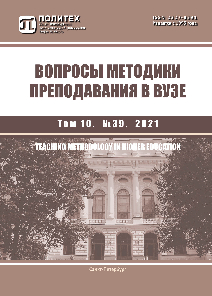DEVELOPMENT OF REFLECTIVE CULTURE IN GRADUATE STUDENTS BY MEANS OF FOREIGN-LANGUAGE
Developmental potential realization of English for specific purposes in higher education, in particular, for specialties related to technology, engineering and information technology, is realized through the process of the foreign language professional communicative competence formation, sustainable cognitive interest development and students’ critical thinking, comprehension of the value significance of foreign language interaction, stimulation of the reflexive mechanisms of self-regulation, manifestation of independent creative activity and the desire for self-development. The reflective culture of a specialist as an acmeological invariant of professionalism covers the cognitive abilities to perceive, to process and to structure professionally significant information, as well as complex personal states associated with the actualization of the cognitive motives, autonomy and independence in managing one’s activities and the analysis of the activity products. The subject-active, axiological, anthropocentric, reflective and polysubjective approaches were used to study the problem of fostering independence, awareness, responsibility and targeted regulation of technical graduate students’ behavior using the language being studied. The research methods included the analysis of the foreign-language teaching technologies and techniques used as tools for self-presentation and self-assessment of educational achievements, the analysis of the students’ reflective judgments, the expert assessment of educational products, research and students’ creative activities, etc.



